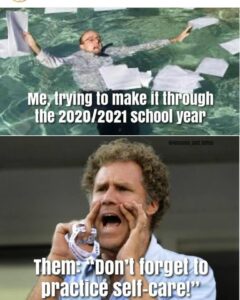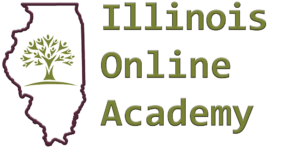It is 10:26 on Saturday morning, I woke up at 7 to write this post and I have 19 words written. You might be thinking writer’s block or procrastination, but the reality is that my 7 year old asked me to cuddle with her on the couch and watch “D2: The Mighty Ducks”. A few years ago, I would have suggested that she watch her movie while I work next to her. Today, I put away my computer, got blankets and pillows for us and snuggled up next to her to watch Team USA Ducks take the win over Iceland.
So why the change in how I handled this situation? Why did I choose to snuggle instead of write? For many reasons (No, I am not a secret Mighty Ducks fanatic), but they all stem from the fact that I personally have struggled with compassion fatigue and burnout in the past. Knowing this about myself I have to consciously make different choices than what I made in the past so that I don’t fall into this downward spiral again.

I consider myself lucky, I found my calling in education. Most days 😊, what I do doesn’t feel like work, I thoroughly enjoy going to work and don’t even dread Sunday nights hehe. Putting in extra hours “beyond the contract”, working on the weekends, last one to leave the school, first to arrive – that’s me….I do it not because I have to or because I am bad at time management, but because I LOVE what I’m doing when I put in all those hours! But what happens when that passion dries out, you are being pulled in too many directions or something happens in your personal life unexpectedly? Sound familiar?
As you stroll through your Twitter feed, peruse Pinterest, talk to colleagues/family, etc. it is nearly impossible to do so without finding something related to teacher self-care, teacher burnout, or a teacher shortage. Yet, I laugh at the image on the left….we know the value and importance of self-care but are we being proactive as educational leaders to support our staff in self-care and providing opportunities for staff to put on their oxygen masks? Or are we just reminding them that they need to practice self-care and thus adding yet another “to-do” to their list??
Self-care can seem selfish, time consuming and even stressful when you are trying to balance it all. Between personal, social, spiritual, family, & professional commitments self-care is often the first thing to go in a busy schedule and an overly packed list of chores. However, by skipping the interventions and preventions that combat stress and the craziness that life brings us, we are putting ourselves more at risk of suffering from burnout and even compassion fatigue. Unfortunately, I didn’t know what compassion fatigue was until it was too late. Now after a few years of reflecting and researching I am well aware of my triggers and the role my childhood trauma has played in my career and how my cost of caring became burdensome to my loved ones. This self-awareness has transformed my life, made me a better educational leader, teacher, mom, friend, spouse, etc.. I have witnessed first hand how work-life balance is not enough; we need to make cognizant decisions to implement preventative measures into our professional lives so that we can show up and continue to give to others while not losing ourselves in the process.

Two years ago I worked collaboratively to design an administrator’s academy focused on supporting educational leaders in recognizing the effects educators suffer from as first responders to student trauma and how to combat those effects. I have delivered this academy several times in-person and am now beyond excited to be able to offer this professional development as a 100% online, asynchronous academy/workshop! You heard that right….you will now be able to take AA3640 “Compassion Fatigue & Burnout: Is Your Staff At Risk” any time, any where!
Throughout this academy participants will:
- Learn how to identify risk factors and symptoms of compassion fatigue and burnout with their staff.
- Be able to seamlessly implement preventative measures and interventions to combat compassion fatigue and burnout.
- Identify the role trauma plays within their school and explain the difference between primary and secondary trauma and the effects it has on students and faculty.
- Distinguish between compassion fatigue and burnout in order to be able to establish how to support and intervene accordingly.

To say I am passionate about this is an understatement, to be able to support others in learning a lesson I had to learn the hard way is something I feel honored to be able to do. We don’t want ourselves or our staff living the life of the tree in “The Giving Tree”- giving and giving until we have nothing left to give, please give yourself and your staff the gift of knowledge by taking advantage of this opportunity and registering for “Compassion Fatigue & Burnout: Is Your Staff At Risk”. Course will open on May 1, 2021! Click here to register.

Katie Algrim – Director of Innovative Professional Learning
(t): 630-444-3044
(c): 630-675-4447
(e): kalgrim@kaneroe.org
